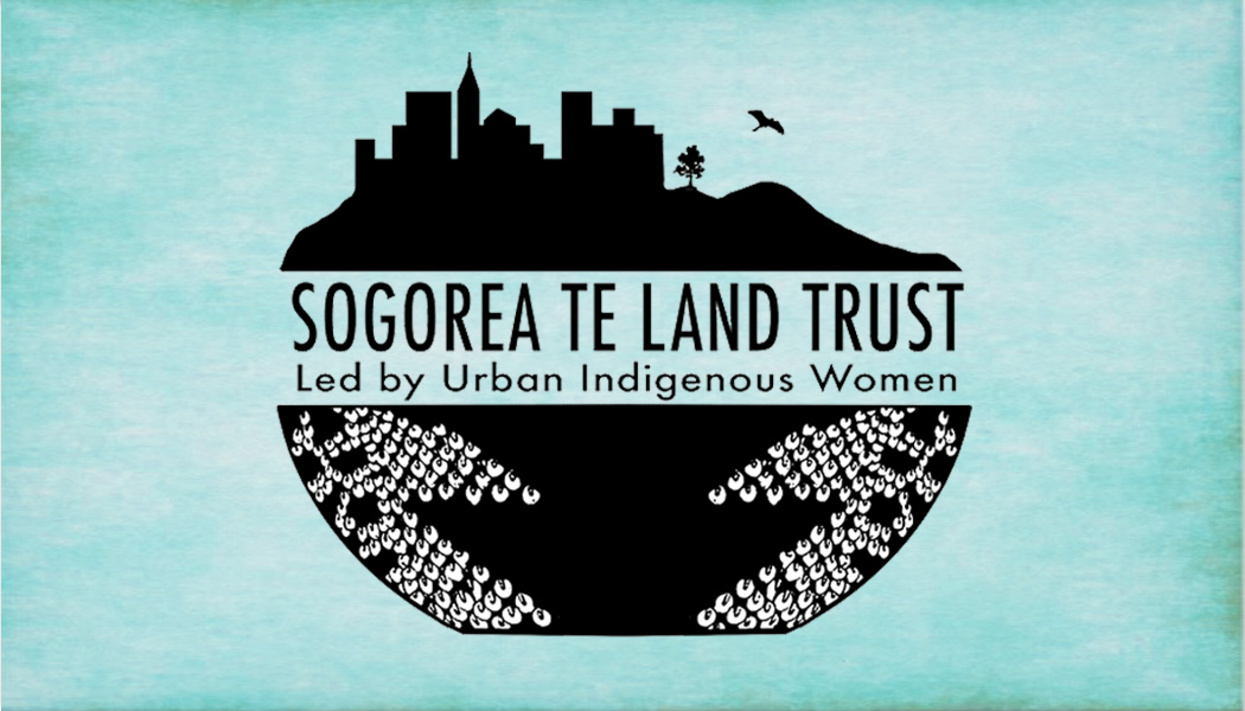A Conversation with the Sogorea Te' Land Trust

with Corrina Gould
Lisjan Ohlone leader and co-founder of the Sogorea Te' Land Trust
moderated by Marcelo Garzo Montalvo
featuring work by Victoria Montano Pena
A History and Theory of New Media Lecture as part of the Indigenous Technologies initiative.
Register for Zoom link here!
Or stream at: https://www.youtube.com/channel/UC8hq6oU__viC_fDu2lhOe7w
Join us for a conversation with the Sogorea Te' Land Trust, an urban Indigenous women-led land trust that facilitates the return of Indigenous land to Indigenous people. Starting in Fall 2020, BCNM commits to paying an annual Shuumi Land Tax, a small step towards acknowledging the history of genocide on this land and contributing to its healing, as well as embarking on our Indigenous Technologies Initiative.
Video and Transcript Now Online
For the video of the seminar, click here.
For the event transcript, click here.
About Corrina Gould
Corrina Gould (Lisjan Ohlone) is the chair and spokesperson for the Confederated Villages of Lisjan— she was born and raised in Oakland, CA, the village of Huichin. A mother of three and grandmother of four, Corrina is the Co-Founder and Lead Organizer for Indian People Organizing for Change, a small Native run organization that works on Indigenous people issues and sponsored annual Shellmound Peace Walks from 2005 to 2009. These walks brought about education and awareness of the desecration of sacred sites in the greater Bay Area. As a tribal leader, she has continued to fight for the protection of the Shellmounds, uphold her nation's inherent right to sovereignty, and stand in solidarity with her Indigenous relatives to protect our sacred waters, mountains, and lands all over the world.
Her life’s work has led to the creation of Sogorea Te’ Land Trust, a women-led organization within the urban setting of her ancestral territory of the Bay Area. Sogorea Te' Land Trust works to return Indigenous land to Indigenous people. Based on an understanding that Oakland is home to many peoples that have been oppressed and marginalized, Sogorea Te works to create a thriving community that lives in relation to the land. Through the practices of rematriation, cultural revitalization, and land restoration, the Land Trust calls on native and non-native peoples to heal and transform legacies of colonization, genocide, and to do the work our ancestors and future generations are calling us to do.
About Marcelo Garzo Montalvo
Marcelo Garzo Montalvo (he/they; Mapuche/Chilenx) is a musician, danzante (ceremonial dancer) and Ethnic Studies scholar-activist. They are Visiting Assistant Professor of Latinx Studies at Harvard University and the Coordinator of Indigenous Technologies at the Berkeley Center for New Media.
About Indigenous Technologies
Indigenous Technologies is a program of the Berkeley Center for New Media that engages questions of technology and new media in relation to global structures of indigeneity, settler colonialism and genocide in the 21st century. Our Indigenous Tech events and ongoing conversations with Indigenous scholars and communities aim to critically envision and reimagine what a more just and sustainable technological future can look like. We will highlight Indigenous engagements with robotics, computer science, telecommunications, artificial intelligence, virtual reality, social media, online activism, video games, and more.
Read a full description of the program and find more resources here.
About the History and Theory of New Media Lecture Series
The History and Theory of New Media Lecture Series brings to campus leading humanities scholars working on issues of media transition and technological emergence. The series promotes new, interdisciplinary approaches to questions about the uses, meanings, causes, and effects of rapid or dramatic shifts in techno-infrastructure, information management, and forms of mediated expression. Presented by the Berkeley Center for New Media, these events are free and open to the public. This year, our events will all take place online via Zoom.
Fall 2020 - Spring 2021 Series Theme: Indigenous Technology
2020
09/10 | 5 — 6:30 PM | A Conversation with the Sogorea Te' Land Trust
Corrina Gould, Lisjan Ohlone leader and co-founder of the Sogorea Te' Land Trust
Moderated by Marcelo Garzo Montalvo
Register here.
POSTPONED | Advancing Hollow Bone Narratives through Media Platform Connectedness
Ruth Hopkins, Dakota/Lakota Sioux writer
11/5 | 5 — 6:30 PM | World Re-Building: Aboriginal Territories in Cyberspace and the Initiative for Indigenous Futures
Skawennati, Artist & Co-Director of Aboriginal Territories in Cyberspace and Skins Workshops in Aboriginal Storytelling in Digital Media
Co-sponsored by the Department of Art Practice
Register here.
2021
2/3 | 5:00-6:30 PM | Indigenous Cyber-relationality: Discerning the Limits and Potential for Connective Action
Marisa Duarte, Assistant Professor, Arizona State University
Co-sponsored by the Center for Information Technology Research in the Interest of Society, the School of Information, and the Center for Race and Gender Studies.
Register here.
4/22 | 5:00-6:30 PM | Indigenous Games
Elizabeth LaPensée, Assistant Professor, Michigan State University
Co-sponsored by the Department of Art Practice
Register here.
Accessibility
BCNM events are free and open to the public. All of our events for the 2020-2021 academic year will be held on Zoom in English, in Pacific Standard Time (PST). We provide live-captioning in Zoom and offer a separate Streamtext window for live-captioning with options to customize text size and display. We strive to meet any additional access and accommodation needs. Please contact info.bcnm [at] berkeley.edu with requests or questions.
BCNM is proud to make conversations with leading scholars, artists, and technologists freely available to the public. Please help us continue this tradition by making a tax-deductible donation today. If you are in the position to support the program, we suggest $5 per event, or $100 a year.
